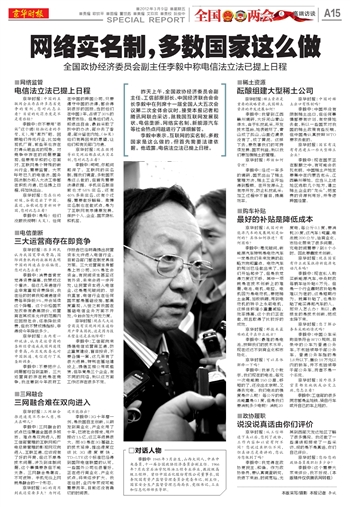This week Li Yizhong (李毅中), the former director of China’s Ministry of Industry and Information Technology (MIIT), spoke with the Beijing Times newspaper and QQ.com about the development of new media in China and related issues, including real-name registration for social media. Li also had time for a quip about Google’s exit from China.
Li, who is attending the “two meetings” in Beijing this week as a member of the Economics Committee of the Chinese People’s Political Consultative Conference (CPPCC), said that real-name registration on China’s social media platforms, a policy formally taking effect on March 16, was meant to ensure “the privacy and secrecy of individuals, corporations and the nation.”

[ABOVE: Today’s edition of the Beijing Times with an interview with Li Yizhong.]
Responding to a question about Google’s “exit” from the China market and rumors that they were working on a re-entry, Li quipped that “if they wish to come back to China again, let them take this up with the relevant [government] departments.”
A partial translation of the internet with Li follows:
Beijing Times: When you were in your position [as director of MIIT], Google made its exit from China. Recently, Google has said it wants to return to China. What do you think about this?
Li Yizhong: Really? They didn’t bother to tell me (big laugh). Any multinational company in China will see a great return so long as they abide by Chinese laws. At that time they had been in China for three years and had 30 percent of the search engine market. They were free to enter or exit, but ultimately they made a trade-off. They partly went to Hong Kong, and partly stayed in mainland China. If they wish to come back to China again, let them take this up with the relevant [government] departments.
Beijing Times: Right now Weibo [microblogs] and other social media [in China] are making a trial run of real-name registration. How do you view this?
Li Yizhong: He he. Each question you ask goes even deeper. According to my own research, real-name registration for the internet is done by many countries around the world. But first it requires a basis in the law. In the mobile phone sector now we’re only at about 58 percent real-name registered, and about 40 percent of the market remains unregistered. This is a process, and it has to be explained. The trials with real-name registration on the Weibo are for the sake of the orderly and healthy development of the internet — in order to protect the privacy and secrecy of individuals, corporations and the nation.
Beijing Times: People within the [internet] industry often remark that the monopoly of [broadband services] by providers has created a situation in which [internet] speeds are low and prices high. Moreover, the National Development and Reform Commission has said it is conducting an investigation into monopoly practices by China Unicom (中国联通) and China Telecom (中国电信).
Li Yizhong: It’s not right to trace every problem back to monopolies. There is competition among the three major providers. I’ve noticed that in this year’s government work report [delivered by Premier Wen Jiabao at the outset of the National People’s Congress this week] already clearly states that private investment will be allowed to enter the telecoms sector. Right now the various [government] agencies are working to formulate concrete plans. The three major providers are all listed companies with about 30 percent social capital (社会资金) investment, so there’s private capital (民间资本) and even foreign investment (外资). In the future it will be opened up even more, allowing private capital (民营资本) to [further] enter the telecoms sector. There’s no question about this. To put it bluntly, the telecoms sector in any country is regarded as core infrastructure (基础设施) and is given great priority. Before we entered the World Trade Organization (WTO), China was not open on the domestic telecoms front, and in the future we will further open it up.




















